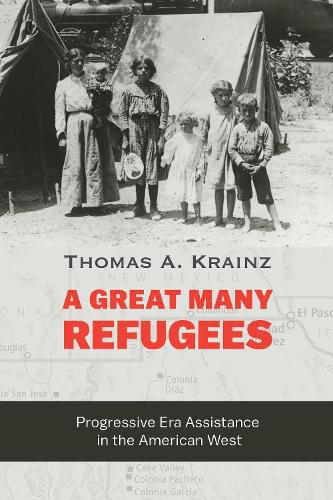Readings Newsletter
Become a Readings Member to make your shopping experience even easier.
Sign in or sign up for free!
You’re not far away from qualifying for FREE standard shipping within Australia
You’ve qualified for FREE standard shipping within Australia
The cart is loading…






Local communities in the late nineteenth and early twentieth centuries commonly addressed the needs of refugees, defined more broadly during the Progressive Era to also include internally displaced people and economic migrants. These communities' efforts to assist people in need created a type of informal "pop-up" welfare, short-term assistance that provided for hundreds, and often thousands, of refugees.
In A Great Many Refugees Thomas A. Krainz examines how communities in the American West cared for refugees. The ten case studies include a range of different causes that forced people to flee, including revolution, war, genocide, environmental disasters, and economic recession. Communities tapped into their local resources to provide for refugees, and this informal welfare proved-in the short term-remarkably efficient, effective, and, at times, flexible and innovative. However, local communities simply could not sustain their widespread relief efforts for long and providing meaningful and comprehensive long-term aid proved a near-universal failure.
Krainz's examination of how Progressive Era residents cared for refugees uncovers a significant segment of welfare policies and practices that have remained largely obscured. These examples of informal, short-term assistance profoundly challenge our standard depiction of local Progressive Era welfare practices as anemic and unresponsive to those in crisis.
$9.00 standard shipping within Australia
FREE standard shipping within Australia for orders over $100.00
Express & International shipping calculated at checkout
Local communities in the late nineteenth and early twentieth centuries commonly addressed the needs of refugees, defined more broadly during the Progressive Era to also include internally displaced people and economic migrants. These communities' efforts to assist people in need created a type of informal "pop-up" welfare, short-term assistance that provided for hundreds, and often thousands, of refugees.
In A Great Many Refugees Thomas A. Krainz examines how communities in the American West cared for refugees. The ten case studies include a range of different causes that forced people to flee, including revolution, war, genocide, environmental disasters, and economic recession. Communities tapped into their local resources to provide for refugees, and this informal welfare proved-in the short term-remarkably efficient, effective, and, at times, flexible and innovative. However, local communities simply could not sustain their widespread relief efforts for long and providing meaningful and comprehensive long-term aid proved a near-universal failure.
Krainz's examination of how Progressive Era residents cared for refugees uncovers a significant segment of welfare policies and practices that have remained largely obscured. These examples of informal, short-term assistance profoundly challenge our standard depiction of local Progressive Era welfare practices as anemic and unresponsive to those in crisis.